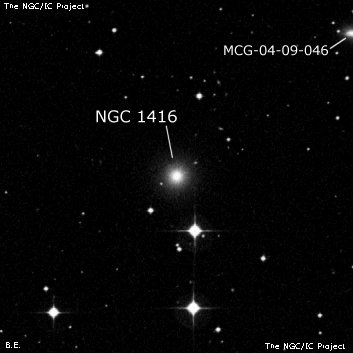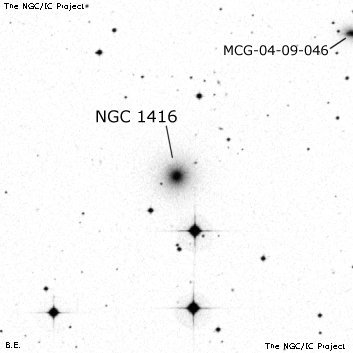NGC/IC Project Restoration Effort
(This is a very very beta version)
NGC1416


Basic Information
Location and Magnitude
Right Ascension: 3:41:2.8
Declination: -22:43:9
Constellation: ERI
Visual Magnitude: 12.9
Historic Information
Discoverer: Muller
Year of discovery: 1886
Discovery aperture: 26.3
Observational
Summary description: eF, S, R, * 8.6 n 2'
Sub-type: E1
Corwin's Notes
=====
NGC 1416 has suffered a bit in the literature. It was discovered by Frank
Muller at Leander McCormick before he and his fellow observers there were
measuring good positions for the nebulae they were finding, so it has an NGC
declination that is about 3.5 arcmin off. In addition, the two bright stars
just south are described as "* 8.7, nr; * 8.6, n 2'". The actual place of the
"* 8.6" is south by 3.5 arcmin, while the "* 8.7" is 1.5 arcmin south.
This apparently confused Herbert Howe, too. He wrote in his second MN paper,
"Muller gave this nebula as 2' north [sic] of a star of mag. 8.6. It is
really south [sic] of the star. There is another star of equal mag. about 5'
south of the star mentioned. The position of the nebula is 03 36 41, -23 02.4
[1900.0]." What Howe should have said is "Muller gave this nebula as 2' south
of a star of mag. 8.6. It is really north of the star. ..." Still, he did
get the galaxy's position right, assuming that this really is the one that
Muller saw. Dreyer copied Howe's corrected declination into a note for IC2.
Carlson had this to say in 1940 about the object: "NGC correct, W" where the
"W" is the source of the note, a Mt. Wilson photograph. She has a footnote on
the object that reads "Howe's correction (D III) to NGC not confirmed" ("D
III" refers to Dreyer's Notes in IC2). Unfortunately, she is wrong as the NGC
declination lands between the two bright stars; Howe is right.
So, nobody has got it completely right. This leads me to question Howe's
identification, which is the usual one adopted by every catalogue since that
includes the galaxy. However, there is no other galaxy in the area that has
two bright stars close to it. So, this is most likely Muller's object.
Steve's Notes
=====
NGC 1416
17.5" (11/2/91): faint, small, round, weak concentration. Located almost on line with mag 9.2 SAO 168733 1.5' SSW and mag 9.3 SAO 168734 3.7' S. A mag 13.5 star is 1' SE. Forms a pair with NGC 1415 9' N. Slightly misplotted 5' too far south on U2000.



